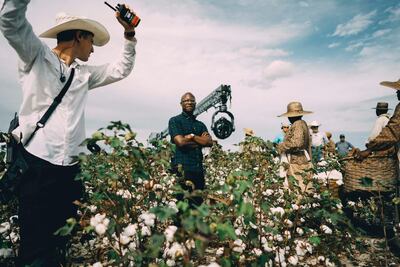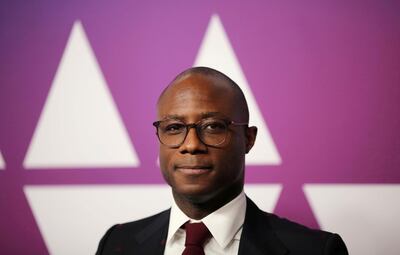It's being called the television event of the year by some critics. Backed by the financial might of Amazon, Barry Jenkins – the Oscar-winning director of Moonlight – takes on Colson Whitehead's Pulitzer Prize-winning novel, The Underground Railroad, in a 10-episode limited series. With an international cast – British, American, Australian and, leading the show, South African newcomer Thuso Mbedu – prestige television doesn't get more, well, prestigious.
Telling the story of Cora (Mbedu), a young girl who starts out enslaved on a Georgia plantation, the show's early reviews have been ecstatic. "Barry Jenkins has moulded something harrowing, emotional and almost too big to take in all at once," wrote trade paper Variety.
Jenkins, 41, from Miami, is certainly conscious that The Underground Railroad will be difficult for some viewers; the opening episode depicts one man being whipped and burnt alive on the plantation.
He talks of finding “the moral and ethical line” when it came to showing the violence inherent in the abhorrent practice of slavery. “I don’t think at any point in the show, we see a close-up of anyone ... of a whip contacting anyone’s flesh,” he says. “In that very first scene, it’s only a wide shot. And then we pan off the acute trauma. And we land on those who are forced to witness that trauma. So I think we try to be thoughtful about the presentation of these images.”
For the cast, certain scenes were hugely difficult to perform. “We had a guidance counsellor on set at all times,” says British actor Aaron Pierre, who plays Caesar, a fellow slave who encourages Cora to escape. “And irrespective of whether you utilise that service or not, just the knowing that that is available, if and when, is enough to sometimes keep you in a positive frame of mind, especially when you’re exploring subject matters like these.”
Jenkins tells one anecdote involving Benjamin Walker, who plays the vicious slave-owner Terrance Randall. Shortly before one particularly troubling scene, Walker asked if he could call his children just before their bedtime. A PA on set politely told him they were about to start shooting, but Jenkins intervened. "I knew he wanted to reaffirm to himself – 'I am this person but now it's my duty to become this [other] person'. I think that's how we kind of got through it."

Much like Steve McQueen's Oscar-winning 12 Years a Slave, as painful as it is watch at points, The Underground Railroad never feels gratuitous. While McQueen's film was grounded in realism, Jenkins and his core team – production designer Mark Friedberg and cinematographer James Laxton – embrace the fantastical elements of Whitehead's book (which the filmmaker optioned even before Moonlight's 2017 Best Picture win at the Oscars turned him into a major director).
In reality, the underground railroad refers to the network of safe houses and secret routes used by men and women fleeing plantations in the American Deep South. When Jenkins was introduced to the idea as a boy, he imagined there to be a real train ferrying slaves to freedom. "I heard it, I thought, 'Oh, yeah, of course. Of course we built trains underground'. And so when I first read Colson's book, I got this feeling again."
Whitehead's book visualises this same idea, as Cora finds a subterranean railway that spirits her on a journey from state to state. Jenkins didn't want to use digital technology to help create this. "[I said] 'I want real tracks, real trains, real tunnels.'" The production utilised a private rail network in Georgia. "So much of this project was trying to contextualise what it would have been like to be my ancestors, which is a very difficult thing to do," he says.
When she boards the train, Cora's trek is not an escape to a better life, however, but a Dante-like journey through hell. She is pursued by Ridgeway, a slave catcher played by Australian star Joel Edgerton, but each situation or place she finds herself in feels barely more tolerable than the plantation – such as the safe house run by Damon Herriman's character where she's incarcerated in an attic crawl-space.
For Mbedu, it was an enlightening odyssey across the marathon 116-day shoot. “It was very important to me to gather as much information as I could about the context of the story,” she says. Jenkins supplied her with reading material and audio clips.
“I realised something vocally about the former enslaved people, that even their voices told a story. And so it was important for me to track Cora’s vocal journey. How she sounds in Episode 1 is completely different to how she sounds in Episode 10.”
Jenkins refers to his “open door policy” when it came to casting; if you were right for the role, it didn’t matter where you came from. But there were other reasons for choosing an international cast. “It was so clear that the condition of American slavery or colonialism doesn’t only rest on America’s shores,” he says. Therefore, selecting a “group of people from so many disparate backgrounds to come together to tell this story” felt “germane to my ancestors”.
Of course, events in the past year in America, including the eruption of the Black Lives Matter protests in the wake of the killing of George Floyd, make a show like The Underground Railroad feel particularly timely.
Pierre hopes the show will resonate around “the global community”, he says, and that it will stir much-needed debate. “I think we have a long way to go in regard to empathy, understanding and unity. And I hope that this contributes to that conversation.”
For all its tough-to-take imagery, Jenkins remains unapologetic. “I do think the audience is ready for it. And if they aren’t, I think that’s fine, too. I think the thing that’s really beautiful about putting images into the world, is that when someone’s ready to find that image, it will be there. And I think that’s what we all did in creating the show, I think it honoured our ancestors.”
For many, that time is now. “I do think folks are ready. I wouldn’t have made it if I didn’t think they were.”
The Underground Railroad is on Amazon Prime Video from Friday



